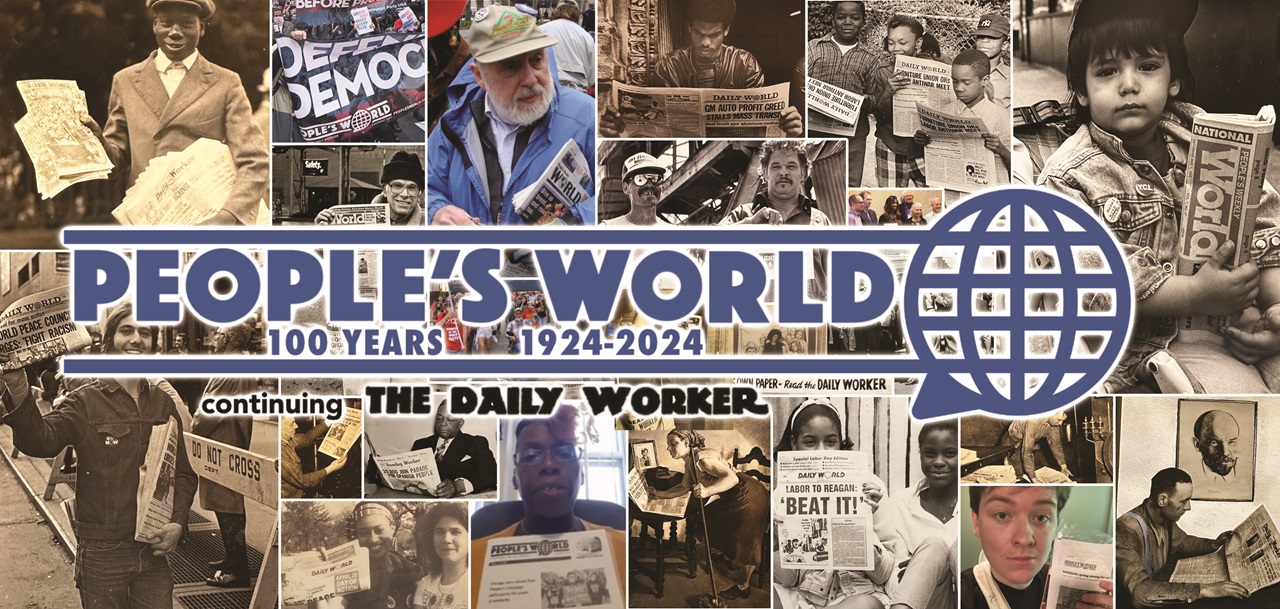
The strongest weapon the ruling class possesses is its control of the press—its domination of the sources through which people get their information.
A hundred years ago, a group of radical workers and Marxist writers launched a publication they hoped would break the monopoly that bosses and their hired media mouthpieces had in deciding what events count as news and how people should interpret them.
They decided to start a daily newspaper based on a truth which could never be found in any of the big papers of the time. That truth was that the people of the United States did not own their own country. They did not own its factories, its railroads, or its banks. They did not own its great material and financial wealth. They did not own its intellectual and technical resources. With no ownership of their economic and social infrastructure, it thus followed that they were not yet truly free.
The Communists of the 1920s dedicated themselves to the mission of putting that truth into print every single day. They embarked on the task of indicting capitalism and the racism, sexism, nationalism, and profiteering at its core—every single day. They jumped into the task of organizing and mobilizing the U.S. working class to struggle for its emancipation and for a socialist future—every single day.
And so, in the early hours of January 13, 1924, inside a cold and dimly-lit building on North Halsted Street in Chicago, the first issue of the Daily Worker rolled off the printing press.
As the sun rose, the stockyards and steel mills of Chicago were blanketed with copies. By afternoon, distributors had fanned out across the industrial centers of the Midwest and the Great Lakes states, putting papers in the hands of workers ending their shifts in Gary, Cleveland, and Detroit. In the evening, stacks reached East Coast cities like New York, Philadelphia, and Washington, with workers packing mass meetings in the hopes of getting their hands on an issue. Within a day, trains had carried bundles to the West Coast ports of San Francisco, Los Angeles, and Seattle.
Other labor and socialist papers had preceded the Daily Worker, with names like The Industrial Worker, The Appeal to Reason, The Ohio Socialist, and The Toiler, but few could claim the Daily Worker’s reach, and none matched its level of ideological clarity. Charles E. Ruthenberg, famed labor leader, anti-war activist, and Communist Party founder, had said five years earlier, “There will never be any hope for us unless we can build up newspapers pledged to the interests of the workers, newspapers which will present the truth about the workers’ cause and offset the lies of the capitalist press.”
For the next ten decades, the Daily Worker and its successors endeavored to be that hope.
The Daily Worker was the voice of unemployed workers and destitute farmers during the Great Depression, pushing for a New Deal and the overhaul of capitalism. Together with the African-American press, it was among the few outlets to condemn Jim Crow racism and the lynch mobs of the old South. It was the tool of organizers who unionized steel, auto, and other major industries and founded the CIO in the ’30s. Women writers, shut out at most of the major newspapers, became some of Daily Worker’s most prolific researchers in that period.
When it came to building a Popular Front in the United States and fighting fascism, there was no publication more central to the effort. From the outbreak of the Spanish Civil War right up to the fall of Berlin, it was the pre-eminent tribune of the anti-fascist movement in this country.
As McCarthyite anti-communism trashed the U.S. Constitution in the 1940s and ’50s, The Worker was the most consistent defender of the Bill of Rights. So threatening was it to the capitalist class, that they actually tried to shut the newspaper down completely. Financial attacks nearly killed the paper, but it never missed a scheduled issue. Even in the darkest days of the Red Scare, it would not be silenced.
In the coming years, the paper would go through a number of new names and mastheads, but its tradition of fighting journalism endured.
When the nuclear arms race threatened to destroy humanity’s existence, it was an unassailable advocate of peace and détente. During the Civil Rights Revolution, it was a rostrum for the Black freedom struggle. As the “New Left” blossomed in the 1960s and ’70s and an anti-imperialist upsurge against the U.S. war in Vietnam broke into the open, the Daily World’s pages were filled with the latest analysis and details of how to get active.
When Ronald Reagan and big business launched their assault on labor in the ’80s, the West Coast People’s World newspaper and the East Coast Daily World joined forces to become the People’s Daily World—a nationwide platform for resistance. While capitalists were celebrating their supposed victory over socialism at the end of the Cold War and pushing the narrative that “there is no alternative” to neoliberal globalization, the People’s Weekly World continued to tell the truth that there was a future beyond capitalism—even if finances meant it could only get that truth out to readers once every seven days.
In the wake of 9/11, with the onset of the seemingly endless “War on Terror” and the growth of the internet revolution, the new online PeoplesWorld.org appeared and revived the tradition of daily Marxist journalism. Throughout the Great Recession, the struggle to save democracy from Trumpism, the COVID-19 pandemic, and the Black Lives Matter uprising, this website was a refuge for progressive and working-class journalism.
Today, with war and the looming danger of fascist revival threatening the world even as resurgent labor and peace movements work to tilt the scales, People’s World is still the place to go for the news and views you need to understand the world—and to change it. And of course, as always, it remains the home for Marxist analysis developed by the Communist Party. Those are the things that make People’s World unique and indispensable.
But People’s World—like the Daily Worker in 1924—is a lone, independent swimmer going against the tide of media monopoly. The multiplicity of voices on social media might give the appearance of a free-for-all, where anyone who has something to say can be heard. The reality, though, is that the level of ruling class power over the press has grown even stronger in the past century.
Most of the “media” in the United States—national 24-hour news channels, local broadcast television news programs, social networking platforms, the major news magazines, newspapers, publishing houses, internet utilities, even video game developers—is owned by just a handful of corporate giants.
Elon Musk, Jeff Bezos, Mark Zuckerberg—survey the Forbes list of the world’s richest people and you will find the names of some of the men who possess almost unlimited power to determine what we see and what we don’t when it comes to getting news.
Whether it’s shadow-banning dissent linked to the war in Gaza, boosting pro-Trump bots online, or limiting the spread of articles and videos about the growing labor fight-back, the algorithms and whims of the media monopolists work overtime to give us a distorted view of our world.
That’s why People’s World is more important than ever.
Throughout 2024, we will be sharing news of celebrations and commemorations that are in the works for the paper’s centennial. We will also bring you selections from our archives and memoirs that showcase the fighting journalism that made this publication famous—or infamous, in the eyes of the bosses.
For 100 years, this newspaper has stood on the firm conviction that the people of the United States must be the authors of their own future. And it has confidently clung to the belief that if our people get organized and fight to democratize not just American politics but also the economy, they will eventually choose to leave the capitalist ruling class behind and chart a path toward a socialist system.
For every one of those hundred years, it has been supported and maintained by the nickels, dimes, and dollars of working people—by readers like you. It is only because of them that this publication has survived and thrived. Ensuring that their contributions are managed wisely is the honor and responsibility of those of us lucky enough to produce People’s World every day. You are our only constituents; we are not beholden to corporate cash or the dictates of the employing class.
So, to all who have read, written for, donated to, distributed, and otherwise supported People’s World and its predecessors for the past century, we say thank you. Without you, this weapon in the hands of the working class would long ago have disappeared. But for as long as it exists, it will keep taking sides—YOURS.
DONATE TODAY – Send People’s World a 100th birthday gift to arm it for the struggles ahead in 2024.












Comments